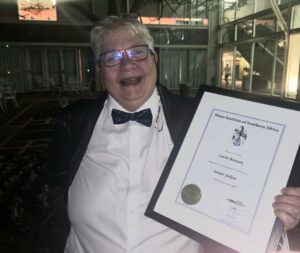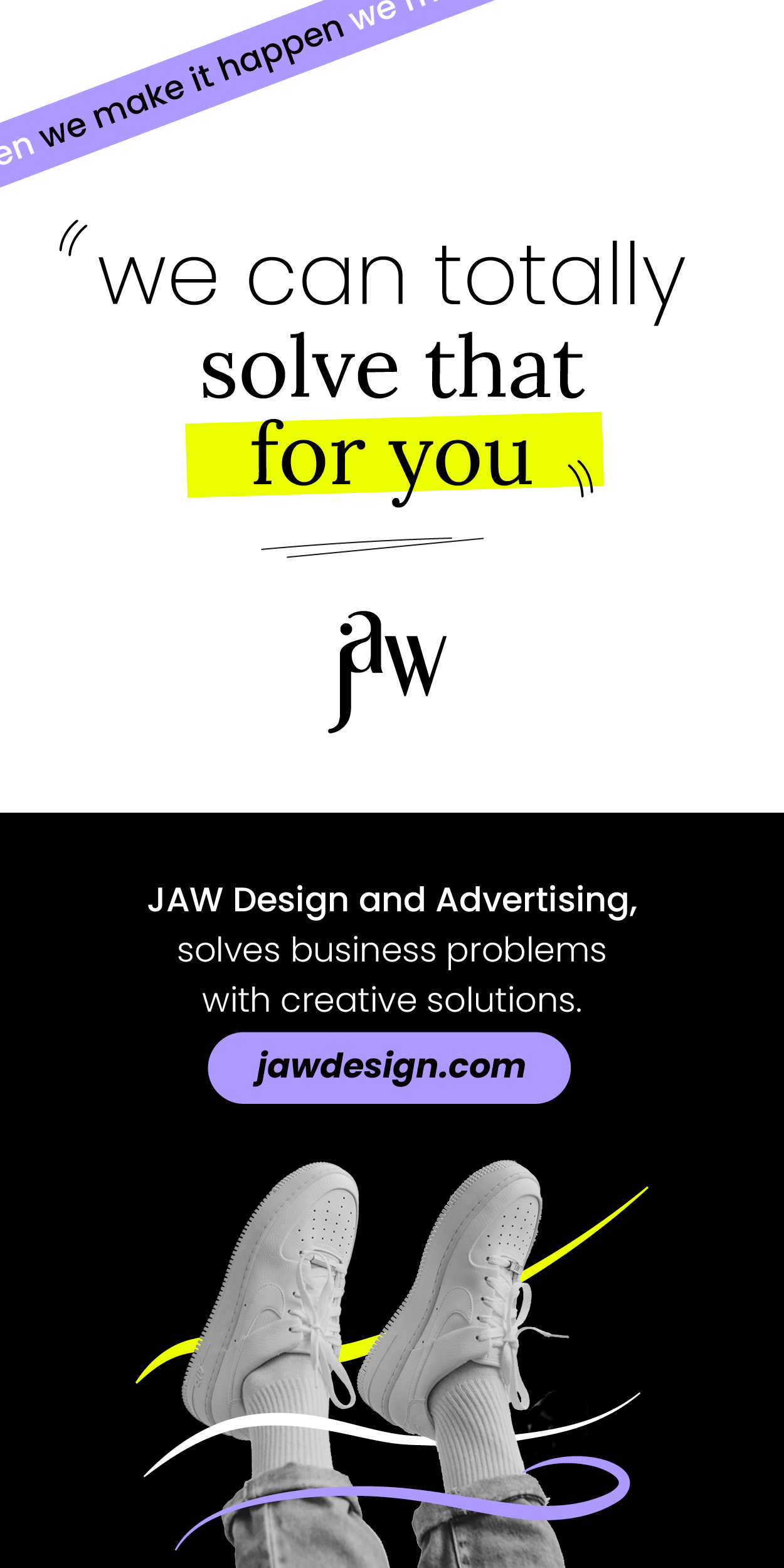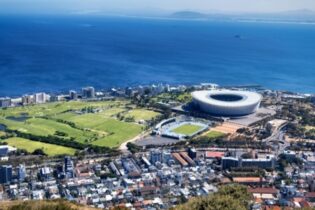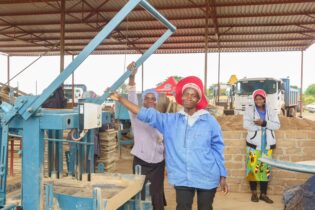The water sector is filled with passionate people, Carin Bosman is one such passionate person, and she serves to remind us of all that water is for the betterment of humanity, and when you are tasked with doing what is right, you have to make some noise.
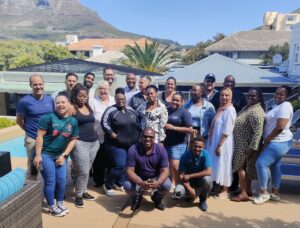 Early on in her career, Carin realised that when you are working with people and when you are working with water you need to keep yourself to a high standard, she says “You need to have a code, you need to be able to guide yourself. Integrity, honesty, scientific correctness, using knowledge and evidence-based information for decision making, the code will then guide you and if something threatens this code then you have to resist.” An example of her code in practice was when she was 25 years old and had the lab at Roodeplaat Dam closed for 6 months. The lab did not have enough safety features and seeing that people’s health and safety were at stake she spoke out. This agitated her then-employers and she had to attend a disciplinary hearing but she remained steadfast. Now when you visit the Roodeplaat Dam laboratories the massive extraction fans are a monument to her solid ethics. “When people’s health and well-being are at stake, you do what is right,” she says of this memory. A lasting impact This code allowed for an astonishing career where her impact is felt throughout the water industry. She worked at the then-named Department of Water Affairs for 14 years in various positions and divisions, such as the deputy director of business planning and the director of water resource protection and waste management. Extraordinary career highlights include:
Early on in her career, Carin realised that when you are working with people and when you are working with water you need to keep yourself to a high standard, she says “You need to have a code, you need to be able to guide yourself. Integrity, honesty, scientific correctness, using knowledge and evidence-based information for decision making, the code will then guide you and if something threatens this code then you have to resist.” An example of her code in practice was when she was 25 years old and had the lab at Roodeplaat Dam closed for 6 months. The lab did not have enough safety features and seeing that people’s health and safety were at stake she spoke out. This agitated her then-employers and she had to attend a disciplinary hearing but she remained steadfast. Now when you visit the Roodeplaat Dam laboratories the massive extraction fans are a monument to her solid ethics. “When people’s health and well-being are at stake, you do what is right,” she says of this memory. A lasting impact This code allowed for an astonishing career where her impact is felt throughout the water industry. She worked at the then-named Department of Water Affairs for 14 years in various positions and divisions, such as the deputy director of business planning and the director of water resource protection and waste management. Extraordinary career highlights include:- Helping to initiate the Blue and Green Drop to improve compliance by local government on water-related matters.
- She was involved with the drafting of the National Water Act 36 of 1998 (NWA).
- The prevention of wide-scale pollution and job losses in the Klerksdorp–Orkney–Stilfontein–Hartbeesfontein (KOSH) area. She saw that mining companies were willing to allow acid mine drainage into the Vaal River once the mines no longer turn a profit. Seeing this as a corporate crime that would have done untold damage in pollution and left many without work, Carin wrote a directive that pushed for these companies to continue pumping at the Margaret Shaft to avoid an environmental and social catastrophe. She proposed a reading of section 19 of the National Water Act that would lawfully require these mining companies to continue pumping water away from the Vaal. The High Court of South Africa agreed with her interpretation resulting in the continued pumping at the Margaret Shaft to this day.
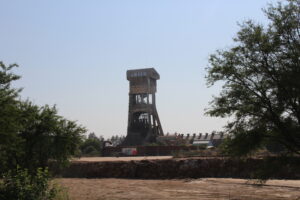 The company has a strong focus on leading the water sector through the fourth industrial revolution and launched its innovative Leguaan Software-as-a-Service™ data visualisation program. Carin says, “The sector does so much work but the decision-makers and community stakeholders are usually not technically minded. Making the data accessible through visualisation is imperative to make good and better decisions.” The software converts water quality monitoring data into interactive graphs that everyone can understand. It assesses the equity and efficiency of water resource allocation and distribution, balancing water use between socio-economic activities and ecosystems. This “software as a service” pushes the water sector out of the Excel spreadsheet era and makes data accessible and understandable to those who need to make informed decisions. She has launched the WaterMonster™ app which is designed to streamline water sample collection by capturing essential field data directly on a mobile device. It records various details including the type of water sample, weather conditions at the monitoring location, and characteristics of the water such as colour, odour, and flow. The app also logs field readings like temperature, electrical conductivity, and dissolved oxygen, as well as the geo-location and photos of the sampling site. If a sample cannot be taken, it documents the reasons. Additionally, the app calculates the purge time for boreholes.
The company has a strong focus on leading the water sector through the fourth industrial revolution and launched its innovative Leguaan Software-as-a-Service™ data visualisation program. Carin says, “The sector does so much work but the decision-makers and community stakeholders are usually not technically minded. Making the data accessible through visualisation is imperative to make good and better decisions.” The software converts water quality monitoring data into interactive graphs that everyone can understand. It assesses the equity and efficiency of water resource allocation and distribution, balancing water use between socio-economic activities and ecosystems. This “software as a service” pushes the water sector out of the Excel spreadsheet era and makes data accessible and understandable to those who need to make informed decisions. She has launched the WaterMonster™ app which is designed to streamline water sample collection by capturing essential field data directly on a mobile device. It records various details including the type of water sample, weather conditions at the monitoring location, and characteristics of the water such as colour, odour, and flow. The app also logs field readings like temperature, electrical conductivity, and dissolved oxygen, as well as the geo-location and photos of the sampling site. If a sample cannot be taken, it documents the reasons. Additionally, the app calculates the purge time for boreholes.
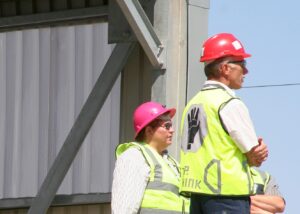 Her years of service to people, and water has not gone unnoticed. The Water Institute of Southern Africa (WISA) awarded Carin their Senior Fellow Award at the WISA Gala during the WISA2024 conference. This award is highly prestigious and is only given out to someone who has made significant contributions to the water sector and has supported WISA over an extended period. Of the award, Carin says, “It is a massive honour to be recognised by WISA. Many of us in the sector work on important projects without ever being acknowledged outside of our peer group. To see my work being celebrated is great.” To this point, she adds, “I think we need to recognise important work. People are doing amazing things that directly impact people and the environment in a positive way and awards can be very fulfilling and allow people to strive for something greater.” WISA is a greatly beneficial organisation, “Yes they provide an umbrella for water professionals, they have good training courses, and provide many opportunities for networking but what sets WISA apart as a professional organisation is that they really listen. A few years ago I had the idea to create some training programs and I approached many organisations with the idea that I create and present the courses and they assist in marketing and CPD points. The only organisation that listened and followed up was WISA.” Carin notes that this quality allows WISA to actively shape the water sector. Using their influence they push projects through and “make things happen” is what makes WISA so important within the sector. Carin notes that whilst at the 2024 WISA conference she spoke to a peer about trying to publish new SANS standards, and there was some bureaucratic hold-up. After speaking to WISA CEO Lester for 5 minutes things started moving. Two weeks after the conference the SANS standards were published. Using their influence to get things moving is very powerful.” Throughout her career, she has championed marginalised voices and diversity in the sciences and is a member of the Quote This Woman+ database, a database for journalists to get information and quotes from experts who are often overlooked such as women and people of colour. “The water sector is filled with passionate and knowledgeable people, and our job also entails informing the public about water. When we do our work right and follow our code of integrity and ethics, we improve lives, and we need to continue our efforts for the betterment of human beings, and to encourage the public to be conscientious about water”. Read here: https://issuu.com/infrastructurenews/docs/wasa_july_august_2024
Her years of service to people, and water has not gone unnoticed. The Water Institute of Southern Africa (WISA) awarded Carin their Senior Fellow Award at the WISA Gala during the WISA2024 conference. This award is highly prestigious and is only given out to someone who has made significant contributions to the water sector and has supported WISA over an extended period. Of the award, Carin says, “It is a massive honour to be recognised by WISA. Many of us in the sector work on important projects without ever being acknowledged outside of our peer group. To see my work being celebrated is great.” To this point, she adds, “I think we need to recognise important work. People are doing amazing things that directly impact people and the environment in a positive way and awards can be very fulfilling and allow people to strive for something greater.” WISA is a greatly beneficial organisation, “Yes they provide an umbrella for water professionals, they have good training courses, and provide many opportunities for networking but what sets WISA apart as a professional organisation is that they really listen. A few years ago I had the idea to create some training programs and I approached many organisations with the idea that I create and present the courses and they assist in marketing and CPD points. The only organisation that listened and followed up was WISA.” Carin notes that this quality allows WISA to actively shape the water sector. Using their influence they push projects through and “make things happen” is what makes WISA so important within the sector. Carin notes that whilst at the 2024 WISA conference she spoke to a peer about trying to publish new SANS standards, and there was some bureaucratic hold-up. After speaking to WISA CEO Lester for 5 minutes things started moving. Two weeks after the conference the SANS standards were published. Using their influence to get things moving is very powerful.” Throughout her career, she has championed marginalised voices and diversity in the sciences and is a member of the Quote This Woman+ database, a database for journalists to get information and quotes from experts who are often overlooked such as women and people of colour. “The water sector is filled with passionate and knowledgeable people, and our job also entails informing the public about water. When we do our work right and follow our code of integrity and ethics, we improve lives, and we need to continue our efforts for the betterment of human beings, and to encourage the public to be conscientious about water”. Read here: https://issuu.com/infrastructurenews/docs/wasa_july_august_2024

